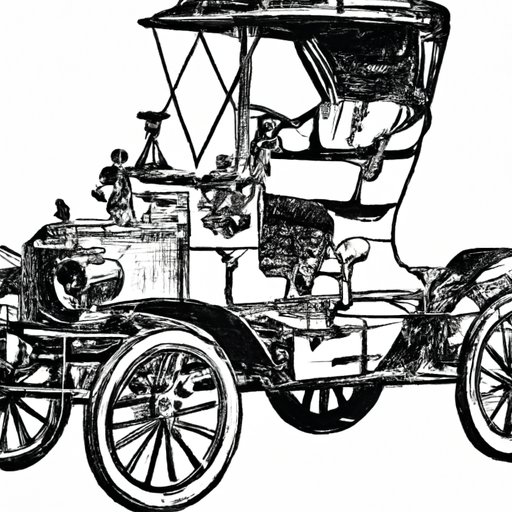Introduction
The automobile is an integral part of our lives, but few people know the story of its invention. This article explores the history of the car, from its earliest prototypes to the modern vehicles we know today. It looks at the innovators behind the first cars, their impact on society, and how automotive technology has developed since the 19th century.

Historical Overview of the Invention of the Automobile
The modern automobile has its roots in the early 19th century, when inventors began experimenting with engines that could power self-propelled vehicles. These early prototypes were limited in range and performance, but they laid the groundwork for the development of the modern car. But who invented the first car? The answer depends on your definition of a car.
Who Invented the First Car?
In 1885, German engineer Karl Benz built the first practical automobile designed for personal transportation. His three-wheeled vehicle was powered by a gasoline engine and had a top speed of 16 kilometers per hour. Benz’s invention marked the birth of the modern automobile industry.
Around the same time, Gottlieb Daimler and Wilhelm Maybach developed their own four-wheeled vehicle, which was powered by an internal combustion engine. While Benz’s design was more successful commercially, Daimler and Maybach’s invention is often credited as the first true car. In the United States, Ransom Olds is credited with producing the first mass-produced car in 1901.

How and When Henry Ford Revolutionized Automotive Technology
Henry Ford revolutionized automotive technology with his inventions and innovations. He introduced the assembly line in 1913, which allowed him to produce cars faster and cheaper than ever before. He also developed the Model T, a car that was affordable for the average consumer. By 1925, half of all cars in the United States were Model Ts.
Ford’s inventions had a profound impact on the automotive industry and society. His assembly line made cars much more affordable, and this led to an explosion in car ownership. By the mid-1920s, cars were becoming commonplace in American cities.

Exploring the Innovators Behind the First Car Inventions
Karl Benz is widely credited as the inventor of the modern automobile. He developed the three-wheeled Motorwagen in 1885, which was powered by a gasoline engine. His invention paved the way for the development of the modern car.
Gottlieb Daimler and Wilhelm Maybach are credited with developing the first true car. Their four-wheeled vehicle was powered by an internal combustion engine and featured several advanced features, such as a steering wheel and differential gear. Daimler and Maybach’s invention helped to pave the way for the development of the modern car.
Ransom Olds is credited with producing the first mass-produced car in 1901. His Oldsmobile Curved Dash was an instant hit, and it helped to popularize cars in the United States. Olds went on to found the Oldsmobile company, which became one of the most successful automakers in the country.
Tracing Automotive Development from the 19th Century to Today
Since the 19th century, automotive technology has come a long way. Cars have become faster, safer, and more reliable. Modern cars feature a variety of advanced technologies, such as fuel injection, antilock brakes, and airbags.
The emergence of the modern automobile has also resulted in changes in transportation. Cars are now the primary mode of transportation for many people, and this has led to increased mobility. People can travel farther and faster than ever before.

A Timeline of Key Events in Automotive History
1885 – Karl Benz builds the first practical automobile.
1901 – Ransom Olds produces the first mass-produced car, the Oldsmobile Curved Dash.
1908 – Henry Ford introduces the Model T, which becomes the most popular car in America.
1913 – Henry Ford introduces the assembly line, revolutionizing automotive production.
1920s – Cars become commonplace in American cities.
1960s – Fuel injection systems are introduced, improving engine efficiency.
1970s – Antilock brakes and airbags are introduced, improving safety.
1990s – Hybrid and electric vehicles are introduced, reducing emissions.
The Impact of Early Automobiles on Society
The invention of the car had a profound impact on society. Cars changed the way people traveled, allowing them to go farther and faster than ever before. This increased mobility had far-reaching consequences, such as the growth of suburbs and the decline of public transportation.
Cars also changed the way people worked and lived. People could now work in one city and live in another, while businesses could expand their operations beyond local markets. This increased economic activity, leading to an overall improvement in living standards.
Examining the Drawbacks of Early Automobiles and How They Were Overcome
Early automobiles had several drawbacks, such as poor fuel efficiency and unreliable engines. These problems were eventually overcome through advances in technology, such as fuel injection systems, which improved engine efficiency, and antilock brakes and airbags, which improved safety.
Today, cars are much more reliable and efficient than the early models. Advances in technology have also made cars safer and more comfortable. Cars are now an indispensable part of modern life.
Conclusion
This article has explored the history of the automobile, from its earliest prototypes to the modern vehicles we know today. We looked at the innovators behind the first cars, their impact on society, and how automotive technology has developed since the 19th century. The invention of the car had a profound impact on society, changing the way people traveled, worked, and lived. Today, cars are an indispensable part of modern life.
(Note: Is this article not meeting your expectations? Do you have knowledge or insights to share? Unlock new opportunities and expand your reach by joining our authors team. Click Registration to join us and share your expertise with our readers.)
